人教新目标九年级英语Unit13 知识点总结和同步练习
- 格式:pdf
- 大小:216.25 KB
- 文档页数:10
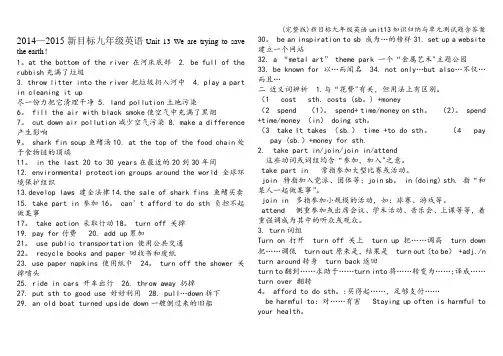
2014—2015新目标九年级英语Unit 13 We are trying to save the earth!1。
at the bottom of the river在河床底部 2. be full of the rubbish充满了垃圾3. throw litter into the river把垃圾扔入河中4. play a part in cleaning it up尽一份力把它清理干净 5. land pollution土地污染6。
fill the air with black smoke使空气中充满了黑烟7。
cut down air pollution减少空气污染 8. make a difference 产生影响9。
shark fin soup鱼鳍汤10. at the top of the food chain处于食物链的顶端11。
in the last 20 to 30 years在最近的20到30年间12. environmental protection groups around the world 全球环境保护组织13.develop laws 建全法律14.the sale of shark fins 鱼鳍买卖15. take part in 参加16。
can’t afford to do sth 负担不起做某事17。
take action 采取行动18。
turn off 关掉19. pay for付费 20. add up累加21。
use public transportation 使用公共交通22。
recycle books and paper 回收书和废纸23. use paper napkins 使用纸巾 24。
turn off the shower 关掉喷头25. ride in cars 开车出行 26. throw away 扔掉27. put sth to good use 好好利用28. pull…down拆下29. an old boat turned upside down一艘倒过来的旧船30。
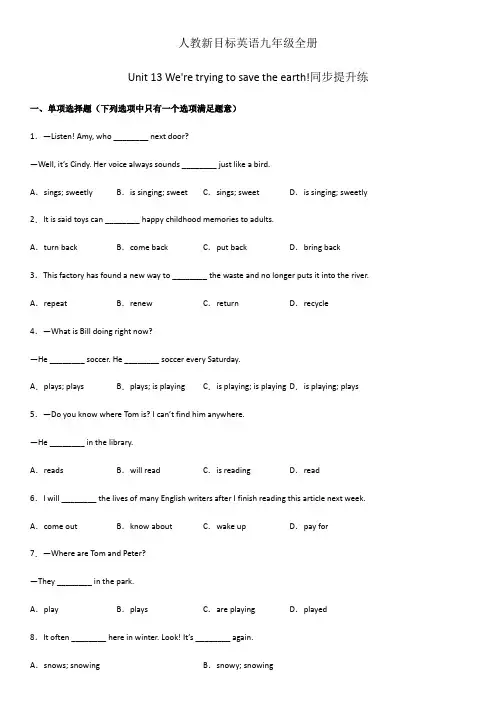
人教新目标英语九年级全册Unit 13 We're trying to save the earth!同步提升练一、单项选择题(下列选项中只有一个选项满足题意)1.—Listen! Amy, who ________ next door?—Well, it’s Cindy. Her voice always sounds ________ just like a bird.A.sings; sweetly B.is singing; sweet C.sings; sweet D.is singing; sweetly 2.It is said toys can ________ happy childhood memories to adults.A.turn back B.come back C.put back D.bring back 3.This factory has found a new way to ________ the waste and no longer puts it into the river. A.repeat B.renew C.return D.recycle 4.—What is Bill doing right now?—He ________ soccer. He ________ soccer every Saturday.A.plays; plays B.plays; is playing C.is playing; is playing D.is playing; plays 5.—Do you know where Tom is? I can’t find him anywhere.—He ________ in the library.A.reads B.will read C.is reading D.read6.I will ________ the lives of many English writers after I finish reading this article next week. A.come out B.know about C.wake up D.pay for 7.—Where are Tom and Peter?—They ________ in the park.A.play B.plays C.are playing D.played8.It often ________ here in winter. Look! It’s ________ again.A.snows; snowing B.snowy; snowingC.snows; snowy D.snowing; snows9.— Not getting that job was a big let-down.— Don’t worry. Something better will ________.A.take up B.come along C.throw away D.break off10.— Alan, come here. I need your help.— Sorry, Dad. He ________ the dishes.A.washed B.washes C.is washing D.are washing11.We ________ carry forward the spirit of serving the people whole-heartedly.A.might B.should C.could12.—Some Chinese government officers have turned into live streamers (网络主播).—Yes. They are trying their best to help local farmers to _______ product sales.A.improve B.compare C.afford13.Students in Class One ________ for the singing competition at the moment.A.prepare B.are preparing C.prepared D.are going to prepare14.The spirit of ox(牛)________ an important role for China's development this year.A.is playing B.was playing C.played15.Look! The musician ________ at the piano, ready to play.A.sat B.will sit C.is sitting D.was sitting二、完型填空根据材料内容,从各题后所给的A、B、C、D四个选项中选出最佳答案。
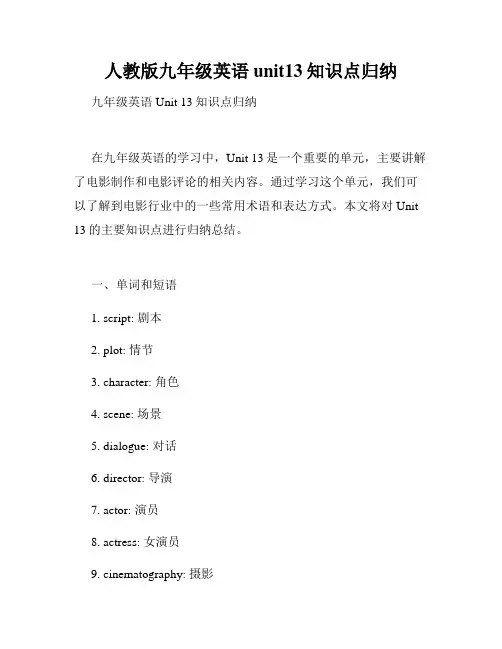
人教版九年级英语unit13知识点归纳九年级英语Unit 13知识点归纳在九年级英语的学习中,Unit 13是一个重要的单元,主要讲解了电影制作和电影评论的相关内容。
通过学习这个单元,我们可以了解到电影行业中的一些常用术语和表达方式。
本文将对Unit 13的主要知识点进行归纳总结。
一、单词和短语1. script: 剧本2. plot: 情节3. character: 角色4. scene: 场景5. dialogue: 对话6. director: 导演7. actor: 演员8. actress: 女演员9. cinematography: 摄影10. special effects: 特效11. soundtrack: 配乐12. box office: 票房13. premiere: 首映式14. sequel: 续集15. genre: 类型二、句型和语法1. 形容词比较级和最高级:例如"The film is more interesting than I expected."和"This is the best movie I've ever seen."2. 定语从句:例如"The actor who played the main character did a great job."3. 被动语态:例如"The film was directed by a famous filmmaker."4. 特殊疑问句:例如"What do you think of the actress in the movie?"5. 宾语从句:例如"He asked me what I thought of the film."三、听力技巧1. 听清语音:要注意区分不同的发音,特别是元音和辅音的区别。
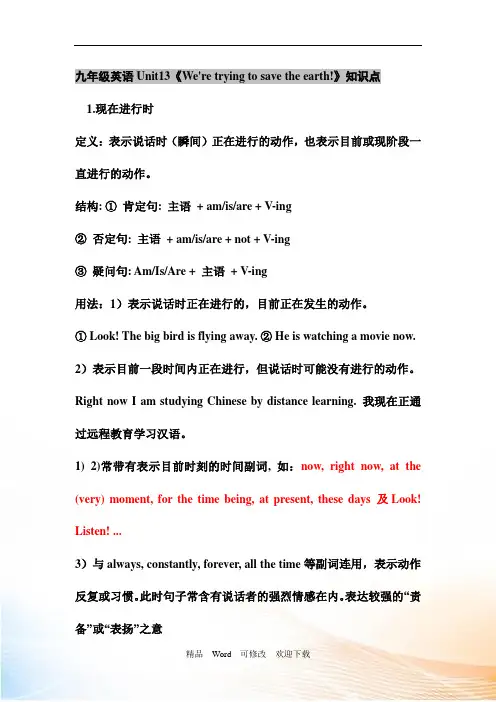
九年级英语Unit13《We're trying to save the earth!》知识点1.现在进行时定义:表示说话时(瞬间)正在进行的动作,也表示目前或现阶段一直进行的动作。
结构: ①肯定句: 主语+ am/is/are + V-ing②否定句: 主语+ am/is/are + not + V-ing③疑问句: Am/Is/Are + 主语+ V-ing用法:1)表示说话时正在进行的,目前正在发生的动作。
① Look! The big bird is flying away. ② He is watching a movie now. 2)表示目前一段时间内正在进行,但说话时可能没有进行的动作。
Right now I am studying Chinese by distance learning. 我现在正通过远程教育学习汉语。
1) 2)常带有表示目前时刻的时间副词, 如:now, right now, at the (very) moment, for the time being, at present, these days及Look! Listen! ...3)与always, constantly, forever, all the time等副词连用,表示动作反复或习惯。
此时句子常含有说话者的强烈情感在内。
表达较强的“责备”或“表扬”之意① Y ou are always changing your mind. 你总是主意不定。
(太烦人了)② He is always helping others.他总是帮助别人。
(他真是个好人)4)对于come, go, leave, arrive, start, fly, drive等表示位置移动的动词常可用进行时态表将来。
① He is leaving on Wednesday.② Mary isn’t here at the moment. She is coming later.ed to do过去常常做某事见第四单元及use用法be/get used to doing 习惯于做某事be used to do=be used for doing 被用来做某事3.被动语态见第五单元注意:接双宾语的词的被动语态;make /let /have sb do的被动语态;see/ hear /notice /find /observe/notice sb do的被动语态;It’s said/reported/believed/supposed/well-known that;及无被动语态的三种情况(感官动词、不及物动词、sell/write等)4.现在完成时:用法:①过去发生的动作对现在造成的影响或结果:强调结果Yesterday I finished my homework, that’s to say, I have finished my homework now.②过去已经开始一直持续到现在的动作或状态:强调继续I have lived here since 1990.现在完成时的构成have/has+过去分词现在完成时的四个基本句型肯定句He has finished the work.一般疑问句Has he finished the work?否定句He has not finished the work.两回答Yes ,he has. No, he hasn’t.特殊疑问句What has he done?在下列情形下用现在完成时1九词语①already 已经肯定句中或句尾I have already found my pen. = I have found my pen already.②yet已经否定句和疑问句句尾I have not finished the work yet. Have you bought a computer yet?③ever曾经句中Have you ever seen pandas?④never从不句中I have never been to Beijing.⑤just刚刚句中I have just done my work.⑥before以前句尾I have never been there before.⑦so far到目前为止So far he has learned 200 words.⑧how long多久How long have you lived here?⑨how many times多少次How many times has he been to Beijing? 2两词组have<has>gone to去了某地例:He has gone to Beijing (去了北京,没回)have<has>been to去过某地例:He has been to Beijing. (去过北京,回了)3两结构for two months for +一段时间Jim has lived here for 2months.since last year since +过去时间点Lucy has been in Beijing since 3 years ago.since 3 years ago since 1990since he came here since +过去时态句子He has been in China since he came here.4如果句子里面没有时间状语,汉语意思能够加“已经”,往往用现在完成时态。
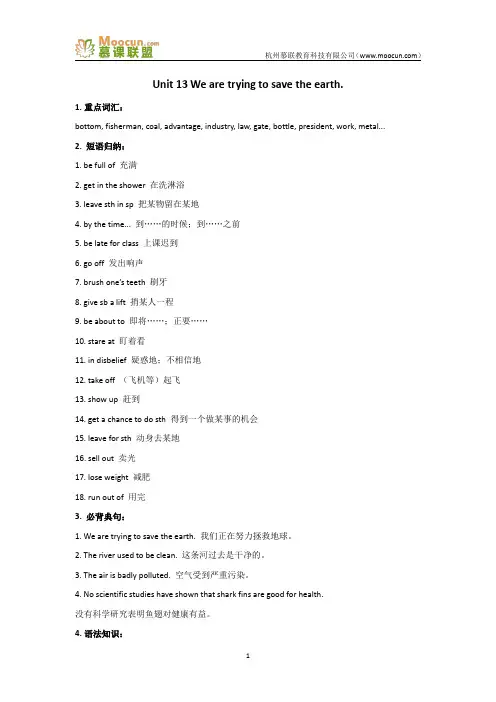
Unit 13 We are trying to save the earth.1.重点词汇:bottom, fisherman, coal, advantage, industry, law, gate, bottle, president, work, metal...2. 短语归纳:1. be full of 充满2. get in the shower 在洗淋浴3. leave sth in sp 把某物留在某地4. by the time... 到……的时候;到……之前5. be late for class 上课迟到6. go off 发出响声7. brush one’s teeth 刷牙8. give sb a lift 捎某人一程9. be about to 即将……;正要……10. stare at 盯着看11. in disbelief 疑惑地;不相信地12. take off (飞机等)起飞13. show up 赶到14. get a chance to do sth 得到一个做某事的机会15. leave for sth 动身去某地16. sell out 卖光17. lose weight 减肥18. run out of 用完3. 必背典句:1. We are trying to save the earth. 我们正在努力拯救地球。
2. The river used to be clean. 这条河过去是干净的。
3. The air is badly polluted. 空气受到严重污染。
4. No scientific studies have shown that shark fins are good for health.没有科学研究表明鱼翅对健康有益。
4.语法知识:英语句子成分分析组成句子的各个部分叫做句子成分。
它包括:主语、谓语、宾语、定语、状语、表语和宾语补足语等。
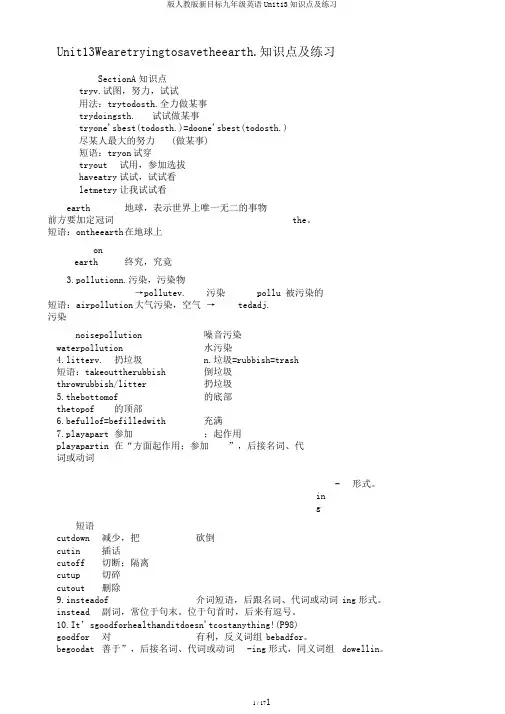
Unit13Wearetryingtosavetheearth.知识点及练习SectionA知识点tryv.试图,努力,试试用法:trytodosth.全力做某事trydoingsth. 试试做某事tryone'sbest(todosth.)=doone'sbest(todosth.)尽某人最大的努力(做某事)短语:tryon 试穿tryout 试用,参加选拔haveatry 试试,试试看letmetry 让我试试看earth 地球,表示世界上唯一无二的事物前方要加定冠词短语:ontheearth 在地球上the。
onearth终究,究竟3.pollutionn.污染,污染物→pollutev.短语:airpollution 大气污染,空气污染污染→pollutedadj.被污染的noisepollution 噪音污染waterpollution 水污染4.litterv. 扔垃圾n.垃圾=rubbish=trash短语:takeouttherubbish 倒垃圾throwrubbish/litter 扔垃圾5.thebottomof 的底部thetopof 的顶部6.befullof=befilledwith 充满7.playapart 参加;起作用playapartin 在“方面起作用;参加”,后接名词、代词或动词-ing形式。
短语cutdown 减少,把砍倒cutin 插话cutoff 切断;隔离cutup 切碎cutout 删除9.insteadof 介词短语,后跟名词、代词或动词ing形式。
instead 副词,常位于句末。
位于句首时,后来有逗号。
10.It’sgoodforhealthanditdoesn'tcostanything!(P98)goodfor 对有利,反义词组bebadfor。
begoodat 善于”,后接名词、代词或动词-ing形式,同义词组dowellin。
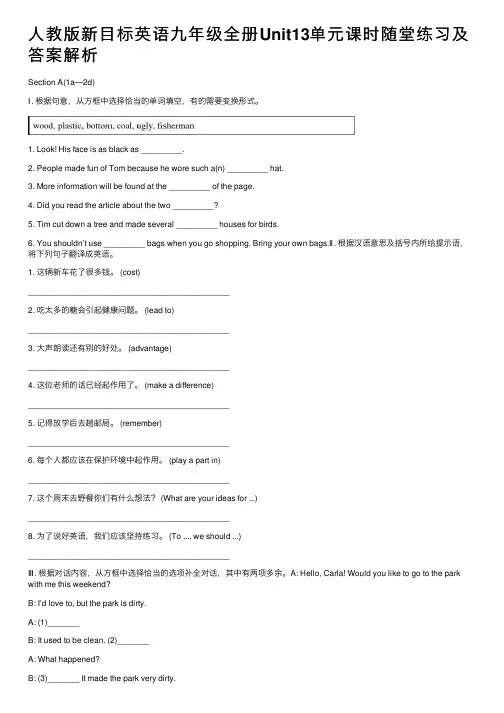
⼈教版新⽬标英语九年级全册Unit13单元课时随堂练习及答案解析Section A(1a—2d)Ⅰ. 根据句意,从⽅框中选择恰当的单词填空,有的需要变换形式。
1. Look! His face is as black as _________.2. People made fun of Tom because he wore such a(n) _________ hat.3. More information will be found at the _________ of the page.4. Did you read the article about the two _________?5. Tim cut down a tree and made several _________ houses for birds.6. You shouldn’t use _________ bags when you go shopping. Bring your own bags.Ⅱ. 根据汉语意思及括号内所给提⽰语,将下列句⼦翻译成英语。
1. 这辆新车花了很多钱。
(cost)____________________________________________2. 吃太多的糖会引起健康问题。
(lead to)____________________________________________3. ⼤声朗读还有别的好处。
(advantage)____________________________________________4. 这位⽼师的话已经起作⽤了。
(make a difference)____________________________________________5. 记得放学后去趟邮局。
(remember)____________________________________________6. 每个⼈都应该在保护环境中起作⽤。
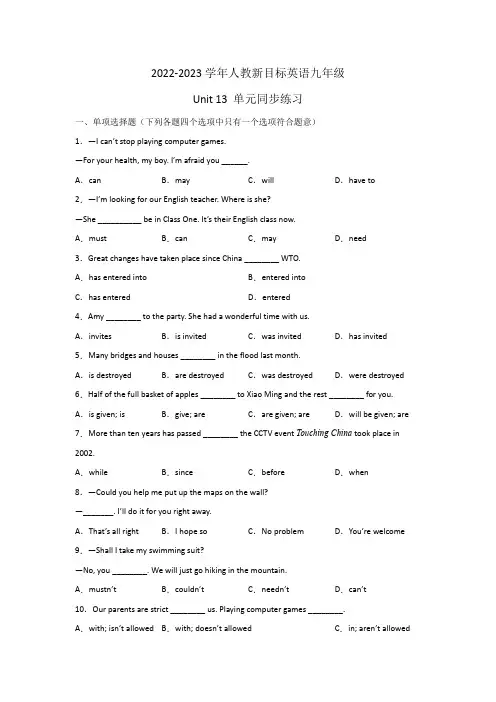
2022-2023学年人教新目标英语九年级Unit 13 单元同步练习一、单项选择题(下列各题四个选项中只有一个选项符合题意)1.—I can’t stop playing computer games.—For your health, my boy. I’m afraid you ______.A.can B.may C.will D.have to 2.—I’m looking for our English teacher. Where is she?—She __________ be in Class One. It’s their English class now.A.must B.can C.may D.need 3.Great changes have taken place since China ________ WTO.A.has entered into B.entered intoC.has entered D.entered4.Amy ________ to the party. She had a wonderful time with us.A.invites B.is invited C.was invited D.has invited 5.Many bridges and houses ________ in the flood last month.A.is destroyed B.are destroyed C.was destroyed D.were destroyed 6.Half of the full basket of apples ________ to Xiao Ming and the rest ________ for you. A.is given; is B.give; are C.are given; are D.will be given; are 7.More than ten years has passed ________ the CCTV event Touching China took place in 2002.A.while B.since C.before D.when 8.—Could you help me put up the maps on the wall?—_______. I’ll do it for you right away.A.That’s all right B.I hope so C.No problem D.You’re welcome 9.—Shall I take my swimming suit?—No, you ________. We will just go hiking in the mountain.A.mustn’t B.couldn’t C.needn’t D.can’t10.Our parents are strict ________ us. Playing computer games ________.A.with; isn’t allowed B.with; doesn’t allowed C.in; aren’t allowedD.in; don’t allow11.— I can’t understand why so many people buy smuggled cellphones(水货手机).— Because they are cheap. A smuggled cellphone is ________ half the price of a licensed one (行货).A.spent B.cost C.worth D.paid12.—Why don’t you buy the bike, Mary?—Because it’s too expensive. I can’t ________ it.A.sell B.lend C.keep D.afford13.—Do you give her your phone?—________. She said she would return it to me when she could afford her own.A.Not exactly B.No doubt C.My pleasure D.All right 14.—We are in trouble now. I have no idea ________.—Neither do I. We have to ask for help.A.how can the problem be solved B.how the problem can be solvedC.how can we solve the problem D.how the problem can solve15.—Shall we go to the cinema?—________. But I don’t know what films are on now.A.It takes time B.Good idea C.Maybe you’re right D.Don’t mention it 二、完形填空阅读下面短文,从短文后各题所给的A、B、C、D四个选项中选出能填入空白处的最佳选项,使短文完整、通顺、正确。
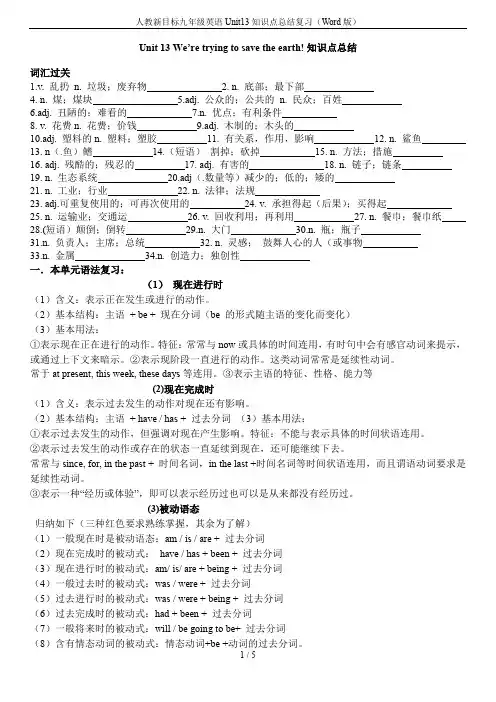
Unit 13 W e’re trying to save the earth!知识点总结词汇过关1.v. 乱扔n. 垃圾;废弃物2. n. 底部;最下部4. n. 煤;煤块5.adj. 公众的;公共的n. 民众;百姓6.adj. 丑陋的;难看的7.n. 优点;有利条件8. v. 花费n. 花费;价钱9.adj. 木制的;木头的10.adj. 塑料的n. 塑料;塑胶11. 有关系,作用,影响12. n. 鲨鱼13. n(.鱼)鳍14.(短语)割掉;砍掉15. n. 方法;措施16. adj. 残酷的;残忍的17. adj. 有害的18. n. 链子;链条19. n. 生态系统20.adj(.数量等)减少的;低的;矮的21. n. 工业;行业22. n. 法律;法规23. adj.可重复使用的;可再次使用的24. v. 承担得起(后果);买得起25. n. 运输业;交通运26. v. 回收利用;再利用27. n. 餐巾;餐巾纸28.(短语)颠倒;倒转29.n. 大门30.n. 瓶;瓶子31.n. 负责人;主席;总统32. n. 灵感;鼓舞人心的人(或事物33.n. 金属34.n. 创造力;独创性一.本单元语法复习:(1)现在进行时(1)含义:表示正在发生或进行的动作。
(2)基本结构:主语+ be + 现在分词(be 的形式随主语的变化而变化)(3)基本用法:①表示现在正在进行的动作。
特征:常常与now或具体的时间连用,有时句中会有感官动词来提示,或通过上下文来暗示。
②表示现阶段一直进行的动作。
这类动词常常是延续性动词。
常于at present, this week, these days等连用。
③表示主语的特征、性格、能力等(2)现在完成时(1)含义:表示过去发生的动作对现在还有影响。
(2)基本结构:主语+ have / has + 过去分词(3)基本用法:①表示过去发生的动作,但强调对现在产生影响。
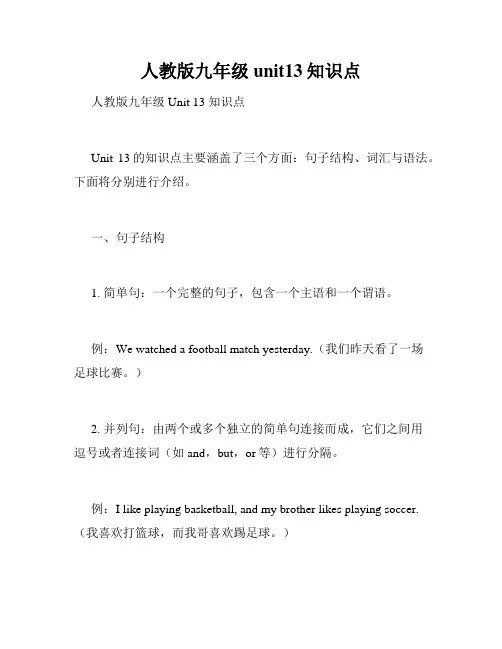
人教版九年级unit13知识点人教版九年级Unit 13 知识点Unit 13的知识点主要涵盖了三个方面:句子结构、词汇与语法。
下面将分别进行介绍。
一、句子结构1. 简单句:一个完整的句子,包含一个主语和一个谓语。
例:We watched a football match yesterday.(我们昨天看了一场足球比赛。
)2. 并列句:由两个或多个独立的简单句连接而成,它们之间用逗号或者连接词(如and,but,or等)进行分隔。
例:I like playing basketball, and my brother likes playing soccer.(我喜欢打篮球,而我哥喜欢踢足球。
)3. 复合句:一个完整的句子,由一个或多个主句和一个或多个从句组成。
例:Although it was raining, we still went hiking.(虽然下雨了,但我们还是去爬山了。
)二、词汇1. 人称代词:第一人称(I,we),第二人称(you),第三人称(he,she,it,they)。
例:He is my best friend.(他是我最好的朋友。
)2. 形容词:用于描述名词或代词的特征或属性。
例:The beautiful flowers are in bloom.(美丽的花儿已经开放了。
)3. 副词:修饰动词、形容词或其他副词,用于表示时间、地点、原因等。
例:She runs very fast.(她跑得非常快。
)4. 动词:表示动作、状态或存在的词。
例:They are swimming in the pool.(他们正在游泳池里游泳。
)三、语法1. 一般现在时:表示经常性或习惯性的动作。
例:I always go to bed early.(我总是早睡。
)2. 一般过去时:表示过去发生的动作或状态。
例:She finished her homework last night.(她昨晚完成了她的作业。
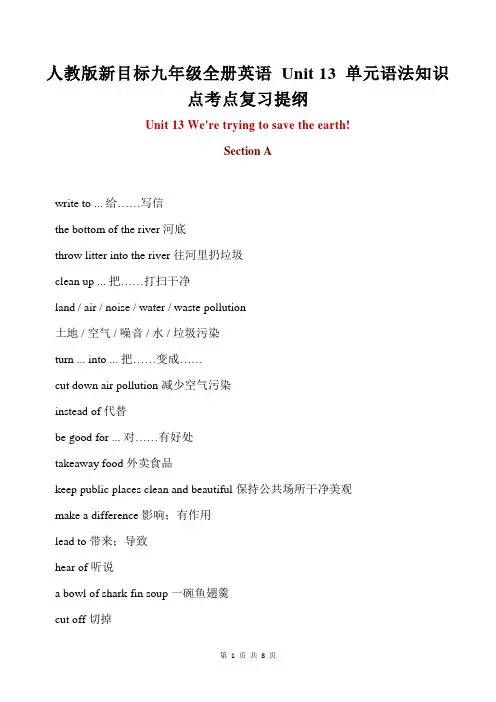
人教版新目标九年级全册英语Unit 13 单元语法知识点考点复习提纲Unit 13 We're trying to save the earth!Section Awrite to ... 给……写信the bottom of the river 河底throw litter into the river 往河里扔垃圾clean up ... 把……打扫干净land / air / noise / water / waste pollution土地 / 空气 / 噪音 / 水 / 垃圾污染turn ... into ... 把……变成……cut down air pollution 减少空气污染instead of 代替be good for ... 对……有好处takeaway food 外卖食品keep public places clean and beautiful 保持公共场所干净美观make a difference 影响;有作用lead to 带来;导致hear of 听说a bowl of shark fin soup 一碗鱼翅羹cut off 切掉be harmful to ... 对……有害no longer 不再at the top of ... 在……顶部或顶端the food chain 食物链environmental protection group 环境保护组织develop laws 制定法律so far 到目前为止scientific studies 科学研究take part in 参加help out 帮助摆脱(困境)take action 采取行动begin with ... 以……开始save electricity 省电turn off the lights / shower 关灯 / 淋浴器pay for 付费;付出代价add up 加起来use public transportation 使用公共交通工具Section Bstop doing sth. 停止做某事ride in cars 乘小汽车paper napkins 餐巾纸throw away 扔掉;抛弃put sth. to good use 好好利用某物have a creative mind 拥有创意的头脑build ... out of ... 用……建造……pull ... down 拆下;摧毁upside down 上下颠倒;倒转in front of ... 在……前面win a prize 获奖open a small shop 开一家小店set up a website 建网站sell ... online 在网上出售……use ... to do sth. 用……做某事set up a small business 经营小生意be known for doing sth. 因做某事而闻名look like 看起来像the importance of environmental protection环境保护的重要性bring back 恢复;使想起;归还【重点句型】1. Even the bottom of the river was full of rubbish. 甚至河底都充满垃圾。
人教版新目标九年级英语Unit13单元知识点总结及练习人教版新目标九年级英语Unit 13单元知识点总结及练习Unit 13 We’re trying to save the earth!重点单词:Littler, bottom, fisherman, coal, ugly, advantage, cost, wooden, plastic, takeaway, cruel, harmful, industry, law, scientific, afford, reusable, recycle, gate, bottle, president,work, metal 重点短语:be full of 充满close down 关闭play a part in 扮演角色clean up 打扫卫生cut down 减少instead of 代替make a difference 起作用,有影响used to 过去常……lead to 通往……hear of 听说be harmful to …对……有害the food chain 食物链at the top of 在……顶部或顶端turn off 关掉take part in 参加pay for 付费;付出代价take action 采取行动throw away 扔掉;抛弃put sth. to good use 好好利用某物pull…down 拆下;摧毁turn upside down 上下颠倒;倒转set up 建起,成立bring sb. Back to 使想起be known for 因……而闻名重点句式:1.It used to be so clean.它过去是那么干净。
2.Everyone in this town should play a part in cleaning it up.我们镇上的每个人都应该尽一份力把这条河清理干净。
期知1.throw litter into the river 把垃圾扔入河中2.play a part in cleaning it up 尽一份力把它清理干净3.fill the air with black smoke 空气中充满黑烟4.cut down air pollution 减少空气污染5.make a difference 产生影响6.shark fin soup 鱼翅汤7.at the top of the food chain 处于食物链的顶端8.in the last 20to 30years 在最近的20到30年间9.develop laws 健全法律10.can ’t afford to do sth.负担不起做某事11.take action 采取行动12.add up 累加e public transportation 使用公共交通14.recycle books and paper 回收书和废纸15.put sth.to good use 好好利用……16.pull...down 拆下17.an old boat turned upside down 一艘倾覆的旧船18.be an inspiration to sb.对某人来说是一种鼓舞19.set up a website 建立一个网站20.be known for 因……而闻名【重点词汇】【重难点句子】1.Sharks may disappear one day if we do not do something to stop the sale of shark fins.如果我们不采取措施来阻止这种鱼鳍买卖,鲨鱼可能有一天会灭绝。
2.This method is not only cruel,but also harmful to the environment.这种方法不仅残酷,而且对环境有害。
3.The numbers of some kinds of sharks have fallen by over 90percent in the last 20to 30years.在最近的20到30年的时间里,某些种类的鲨鱼的数量已经下降了90%。
新目标九年级英语unit13知识点总结Unit 13: Knowledge Points SummaryIntroduction:Unit 13 of the New Concept English textbook for Grade 9 covers various topics related to computers, the Internet, and information technology. This unit provides essential knowledge points that are relevant to the digital era we live in. In this article, we will summarize the key concepts and vocabulary that students need to remember from this unit.Part 1: Computer BasicsFirstly, let's start with the basics. A computer is an electronic device that can receive, process, and store data. It consists of hardware components such as the central processing unit (CPU), memory, and input/output devices. The CPU is like the brain of the computer, executing instructions and performing calculations.Part 2: Computer FunctionalityComputers have different functions, including data input, processing, output, and storage. Input devices, such as keyboards and mice, allow users to enter data into the computer. The computerprocesses this data using software and outputs the results through monitors or printers. Storage devices, like hard drives and USB flash drives, store data for future use.Part 3: Internet and World Wide WebThe Internet is a global network that connects computers worldwide, allowing them to communicate and share information. The World Wide Web (WWW) is a system of interlinked hypertext documents accessed through the internet. Web browsers, like Chrome and Firefox, enable users to navigate and view websites on the web.Part 4: Online Safety and SecurityWhile the internet offers numerous benefits, it also poses risks. Students should be aware of how to protect themselves online. Creating strong passwords, being cautious with sharing personal information, and avoiding suspicious websites are crucial for online safety. Furthermore, installing reliable antivirus software and keeping it up to date helps protect against malware and cyberattacks.Part 5: Social Media and CommunicationSocial media platforms, such as Facebook and Instagram, have revolutionized communication and interaction. They enable users toconnect with friends, share photos, and express opinions. However, students must be mindful of their online behavior, avoiding cyberbullying and respecting others' privacy. It is essential to strike a healthy balance between online and offline activities.Part 6: Information Technology in EducationInformation technology has greatly influenced the education sector. Nowadays, students can access vast amounts of knowledge through online resources, e-books, and educational applications. Virtual classrooms and online courses provide flexible learning opportunities. However, it is crucial to use technology wisely, ensuring it enhances rather than hinders the learning process.Conclusion:Unit 13 covers essential knowledge points related to computers, the internet, and information technology. Understanding the basics of computers, internet safety, social media etiquette, and the role of technology in education is essential for students in the digital age. By grasping these concepts, students can navigate the digital world responsibly and make the most of the opportunities it offers.。
纳1.at the bottom of the river 在河床底部2.be full of rubbish 充满了垃圾3.throw litter into the river 把垃圾扔入河中4.play a part in cleaning it up 尽一份力把它清理干净nd pollution 土地污染6.fill the air with black smoke 空气中充满黑烟7.cut down air pollution 减少空气污染8.make a difference 产生影响9.shark fin soup 鱼翅汤10.at the top of the food chain 处于食物链的顶端11.in the last 20to 30years 在最近的20到30年间12.develop laws 建全法律13.take part in 参加14.can ’t afford to do sth.负担不起做某事15.take action 采取行动16.add up 累加e public transportation 使用公共交通18.recycle books and paper 回收书和废纸19.ride in cars 开车出行20.throw away 扔掉21.put sth.to good use 好好利用22.pull...down 拆下23.an old boat turned upside down 一艘倾覆的旧船24.be an inspiration to sb.对某人来说是一种鼓舞25.set up a website 建立一个网站26.a “metal art ”theme park 一个“金属艺术”主题公园27.be known for 因……而闻名28.not only...but also...不仅……而且……【重点词组或短语】【重难点句子】1.To cut down air pollution,we should take the bus or subway instead of driving.为了减少空气污染,我们应当乘坐公汽或地铁而不是开车。
九年级U n i t13知识点梳理及拓展一、词汇回顾1.乱扔,垃圾,废弃物____________2.底部,最下部_________________3.公众的,公共的______________4.民众,百姓__________________5.优点,有利条件______________6.花费,花费,价钱_____________7.木制的,木头的_____________ 8.塑料的,塑料,塑胶__________9.有关系,作用,影响___________ 10.方法,措施__________________ 11.残酷的,残忍的______________12.有害的_____________________ 13.链子,链条__________________ 14.工业,行业___________________ 15.可重复使用的______________ 16.承担得起(后果)买得起________ 17.回收利用,再利用_____________ 18.大门__________________________ 19.负责人,主席________________ 20.金属__________________________二、词汇变形1.wood(n.木头)→____________________(adj.木制的)2.harm ( n.伤害) →_________________ (adj.有害的) →_________________adj.无害的3.danger(n.危险) →endanger(v.使遭危险;危及) →___________________ (adj.濒危的) →___________________ (adj, 危险的)w(从法律)--lawyer(n.律师)5._____________(n.科学) →___________________ (adj.科学上的,科学的)→___________________ (n.科学家)e(v.使用) →______________ (v.再次使用) →_____________(adj可再次使用的)7.advantage( n.优点;有利条件) →___________________ (反义词) (n.缺点:不利条件)8.__________(v.运输) →__________________(n.运输业:交通运输)9.inspire(n.鼓舞;激励) →___________________ n.灵感;鼓舞人心的人(或事物)10.c reate(v.创造) →_________________ (adj.有创造力的) →________________ (n.创造力:独创性)→___________________ (n.创者)→___________________ (n.创造;作品)三、短语归纳1._________________/________________充满2.______________________把...扔入...里3.________________________过去常常4.________________________在...中发挥作用5.__________________砍倒6._______________________代替,而不是7._________________________有影响,起作用8.__________________导致,通向9._____________________听说10.______________________对...有害11.___________________________不但...而且12.______________到目前为止13._______________________在...顶端或顶部14.____________________________承担得起做15.________________________参加16.______________付费17._______________关掉18.__________________采取行动19._________________扔掉20.________________恢复,归还,使想起21.__________________清理,打扫干净22._______________________在...中发挥作用23._____________________在...底部24._______________________充分利用25.__________________伤害26.________________________...的数量27._________________________违法28.________________________遵守法律30._______________________交通法规31._________________发生32._______________当心,小心33.________________采取措施34.________________占据,开始从事35.________________________想出36._________________赠送,捐赠37.________________成立;建立;建起38.____________________试穿39.____________试验,尝试,参加…选拔四、知识详解1.try to do =try one’s best to do 尽力做某事-e.g. _____________________________________我们将努力在一周内完成这项工作。
新目标九年级英语Unit 13 We’re trying to save the earth! 讲义一、词性转换Section A1. litter → (v.) litter2. wood → (adj.) wooden3. harm → (adj.) harmful4. science → (adj.) scientific5. reuse → (adj) reusable6. transport → (n.)transportationSection B7. inspire → (n.) inspiration8. create → (n.) creativity /(adj.) creative二、短语归纳1. play a part in在……中起作用;参与2. not only…but also…不但……而且……3. no longer 不再4. so far 到目前为止5. take action 采取行动6. cut down 砍倒;减少7. help out 帮……解决困难8. pay for 付费;付出代价9. turn off 关掉10. instead of 代替11. lead to 导致;通向12. be harmful to 对……有害13. at the top of 在……顶部14. clean up打扫干净15. add up 总计;加起来16. begin with 以……开始17. set up 建立18. be made from由……制成(看不出原材料)19. be made of由……制成(看得出原材料)20. take public transportation乘坐公共交通工具21. upside down 上下颠倒;倒转22. be known for 因……闻名23. win a prize 获奖24. be good at擅长于25. ride a bike 骑自行车26. get worse and worse越来越糟糕27. throw away 扔掉;抛弃28. pull down 拆下;拆毁29. put……to good use好好利用某物30. bring back恢复;使想起;归还三、句型集萃1. What are your ideas for… 关于……你有什么看法?2. do A instead of doing B 做A而不做B3. doing sth. can help 做某事有用4. The number(s) of … have fallen by… ……的数量下降了……5. a + adj.最高级+ n. 一个最……的……6. sb. isn’t the only one who ……不是唯一一个……的人四、重点句子1. There are other advantages of bike riding.骑自行车还有其他的优点。
Unit13 We're trying to save the earth!【重点短语】1. at the bottom of the river 在河床底部2. be full of the rubbish 充满了垃圾3. throw litter into the river 把垃圾扔入河中4. play a part in cleaning it up 尽一份力把它清理干净5. land pollution 土地污染6. fill the air with black smoke 使空气中充满了黑烟7. cut down air pollution 减少空气污染8. make a difference 产生影响17. take action 采取行动18. turn off 关掉19. pay for 付费20. add up 累加21. use public transportation 使用公共交通22. recycle books and paper 回收书和废纸23. use paper napkins 使用纸巾24. turn off the shower 关掉喷头25. ride in cars 开车出行【重点句型】1.Even the bottom of the river was full of rubbish.即使河底都充满垃圾。
2.Everyone in town should play a part in cleaning it up.城里的每个人都应当尽一份力把它清理干净。
3.The air is badly polluted because there are too many cars on the road these days.空气被严重污染因为如今路上的汽车太多了。
4.To cut down air pollution, we should take the bus or subway instead of driving.为了减少空气污染,我们应当乘坐公汽或地铁而不是开车。
5. I used to be able to see stars in the sky.我过去能在天空中看到星星。
6. The air has become really polluted around here. I’m getting very worried.这儿的空气真的已经被污染了,我非常担心。
7. No scientific studies have shown that shark fins are good for health.没有科学研究说明鱼鳍对人们的健康有好处。
【知识点】1. cost vt.1. 花费;价格为;值例句:It must cost a good deal to live here. 住在这里一定要花很多钱的拓展:take,spend ,cost ,pay的用法都可以表示“花费”,但用法却不尽相同。
1)spend的主语必须是人,常用于以下结构:(1)spend time /money on sth. 在……上花费时间(金钱)。
例:I spent two hours on this maths problem. 这道数学题花了我两个小时。
(2)spend time /money (in)doing sth. 花费时间(金钱)做某事。
例:They spent two years (in)building this bridge. 造这座桥花了他们两年时间。
(3)spend money for sth. 花钱买……例:His money was spent for books. 他的钱用来买书了。
2)cost的主语是物或某种活动,还可以表示“值”,常见用法如下:(1)sth. costs (sb.)+金钱,某物花了(某人)多少钱。
例:A new computer costs a lot of money. 买一台新电脑要花一大笔钱。
(2)(doing)sth. costs (sb.)+时间,某物(做某事)花了(某人)多少时间。
例:Remembering these new words cost him a lot of time. 他花了大量时间才记住了这些单词。
注意:cost的过去式及过去分词都是cost,并且不能用于被动句。
3)take后面常跟双宾语,常见用法有以下几种:(1)It takes sb. +时间+to do sth. 做某事花了某人多少时间。
例:It took them three years to build this road. 他们用了三年时间修完了这条路。
(2)doing sth. takes sb. +时间,做某事花了某人多少时间。
例:Repairing this car took him the whole afternoon. 他花了一下午修车。
4)pay的基本用法是:(1)pay (sb.)money for sth. 付钱(给某人)买……例:I have to pay them 20 pounds for this room each month. 我每个月要付20英磅的房租。
(2)pay for sth. 付……的钱。
例:I have to pay for the book lost. 我不得不赔丢失的书款。
(3)pay for sb. 替某人付钱。
例:Don?蒺t worry!I'll pay for you. 别担心,我会给你付钱的。
(4)pay sb. 付钱给某人。
例:They pay us every month.他们每月给我们报酬。
(5)pay money back 还钱。
例:May I borrow 12 yuan from you? I'll pay it back next week. 你能借给我12块钱吗?下周还你。
(6)pay off one's money还清钱。
2. This method is not only cruel, but also harmful to the environment.这种方法不仅残酷,而且对环境有害。
(1)not only…but also…意为“不仅……而且……”用于连接两个表示并列关系的成分,着重强调后者,其中的also有时可以省略。
如:She not only plays well, but also writes music. 她不仅很会演奏,而且还会作曲。
He not only writes his own plays, he also acts in them. 他不仅是自编剧本,还饰演其中的角色。
He works not only on weekdays but on Sundays as well. 他不仅平时工作,星期日也工作。
(2)若连接两个成分作主语,其谓语通常与靠近的主语保持一致。
如:Not only you but also he has to leave. 不只是你,他也得离开。
(3)若连接两个句子,not only后面的句子要用倒装,如:Not only did he speak more correctly, but he spoke more easily. 他不仅说得更正确,而且讲得更不费劲了。
3. work n. (音乐,艺术)作品work的用法作名词1) 不可数,意为:工作;劳动;作业;功课事,成果,产品;工艺品,针线活如:It takes a lot of work to dig a deep well.挖一口深井很费事。
I have to bring my work home today. 今天我得把工作带回家做。
2) 作可数名词着作,作品He is making a study of William Faulkner's works. 他在研究威廉•福克纳的作品。
作不及物动词(vi.)1) 工作,劳动,干活[(+at/on)] She works in a restaurant.她在一家饭店工作。
2) (机器等)运转,活动The machine won't work.机器不转了。
3) (由于使用等)逐渐变动;慢慢地前进4) 起作用;行得通Your suggestion works well. 你的建议很有效。
作及物动词(vt.)1) 使工作,使干活Don't work yourself to death. 别拼命做了。
2) 开动;操作Please tell me how to work the machine. 请告诉我如何操纵这机器。
3) 通过努力取得;靠做工取得4) 使缓慢前进;使逐渐变动Can you work the screw loose? 你能使这个螺钉松开吗?5) 造成,引起;激起This scientist worked miracles. 这位科学家创造了奇迹。
6)安排,经营,管理He worked the farm with great success. 这个农场他经营得很成功。
8) 影响;说服I'll try to work him to my way of thinking. 我要设法说服他同意我的想法。
9) 精工细做10) 计算,算出【语法归纳】动词不定式做目的状语时的用法To cut down air pollution, we should take the bus or subway instead of driving.为了减少空气污染,我们应当乘坐公汽或地铁而不是开车。
本句中To cut down air pollution是动词不定式作目的状语。
动词不定式做目的状语时的用法一、不定式和不定式短语作目的状语不定式和不定式短语作目的状语,主要用来修饰动词,表示某一动作或状态的目的。
为了使目的意义更加清楚或表示强调意义时,还可以在前面加in order to 或so as to。
例如:I've written it down in order not to forget.He shouted and waved so as to be noticed.在句子中作谓语动词的状语的不定式或不定式短语,表示的是主语的目的,因此,其逻辑主语通常是句子的主语。
比较:To draw maps properly, you need a special pen.(正)To draw maps properly, a special pen is needed.(误)由in order to 引导的目的状语,既可以置于句尾,也可以置于句首,而由so as to 引导的目的状语,只能置于句尾,而不能置于句首。